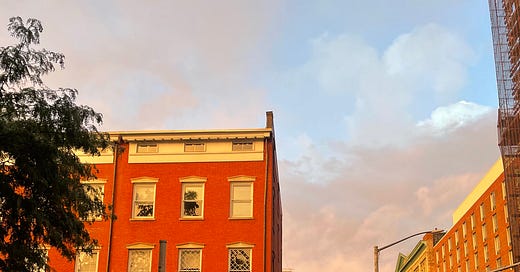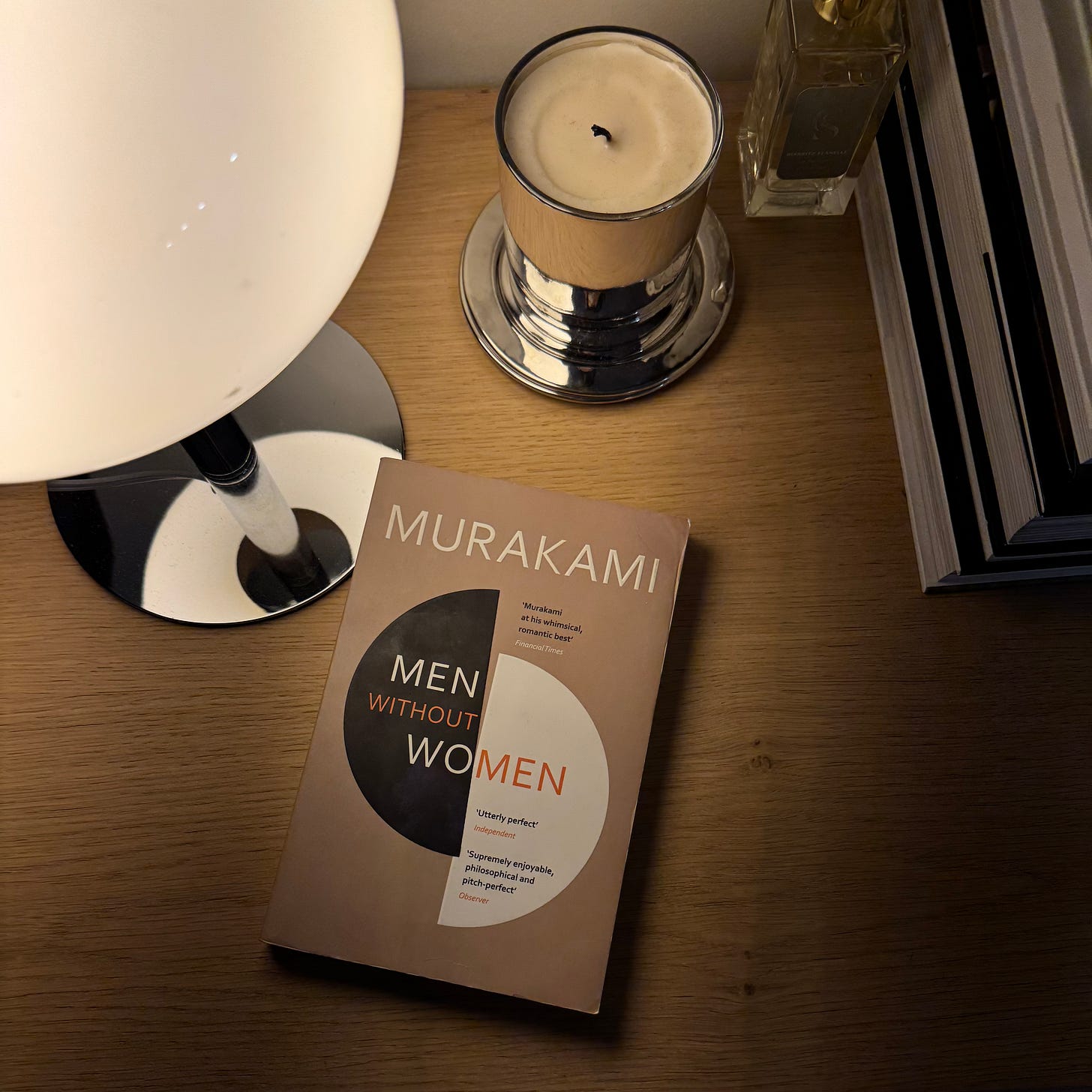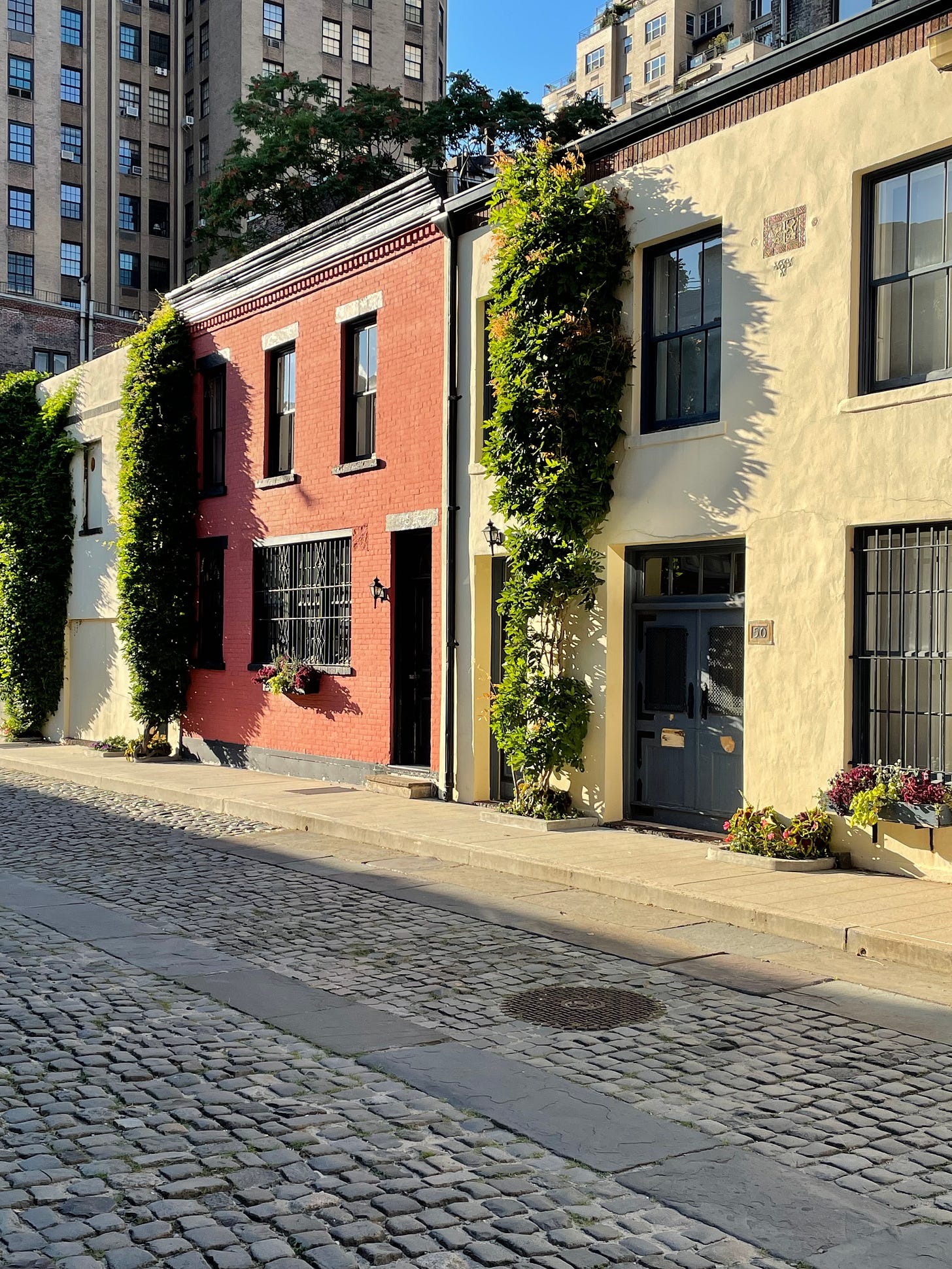Today was a Monday in April. I made myself a humble dinner of chickpea pasta, garnished with week-old tomatoes and minced garlic. Chickpea pasta makes me bloat, but I ate it anyway. Maybe because I didn’t want to drag myself to the store. Or maybe, because I was in the mood to “cook” tonight, whether there was food in the fridge or not. Regardless of the reasoning for my sad meal, an after-dinner stroll was in order.
Tonight, summer was dropping clues. The evening light burned gold between tree branches. I wore boxer shorts, Birkenstocks, socks, and a raincoat hitting just below my shorts—a peculiar outfit for any other activity but this one. I often do this, walk through Washington Square Park at dusk. It’s no nature walk, but there are just enough trees to make you feel connected to something besides concrete. I’d say that’s why we all gather here—students, couples, tourists, painters, street musicians, fathers pushing strollers, dog walkers, and a sizable homeless population. We all like to pretend we’re somewhere else for a moment.
A few steps into the park, I stopped to change the song in my headphones. Simultaneously, a soccer ball hit my Birkenstocks. I looked up, and a group of kids—either Parsons or NYU students—were staring at me. Without being fully aware of it, I suppose, I was standing in the middle of their pickup game underneath the floodlit arch. My feet froze, and they rolled their eyes as if to say get the hell out of our game, lady. I smiled and offered a wave in exchange for trespassing.
My path out of the soccer match led me to the skateboarders’ corner. A boy no older than sixteen—sporting greasy hair and jeans tighter than any pair in my closet—landed a trick. Google informed me that it’s called a Frontside 360. A fancy spin, more or less. He skipped to a halt, cradled the board, and shot a smile to the sky. Simultaneously, four other mini-Travis Barkers threw their hands in the air, shouting and clapping and whizzing circles around in their friend. Their tattered sneakers blurred into the horizontal, orange light.
Next, I stumbled upon the documentary filmmakers. They were standing on, in my opinion, the most beautiful strip the park. The Northeastern corner, between University Place and Fifth Avenue. This time of year, the maroon townhouses contrast the florescent green tree buds, sprouting color so vivid it doesn’t really seem real. A director led the group, while a production assistant and three interviewees stood as his audience. Their leader wore a backwards black hat, a grey hoodie, and a backpack overflowing with camera equipment. On the director’s cue, the interviewees spoke to the camera, using their hands to emphasize certain words. I was standing beyond the eavesdrop range, but close enough to watch the camera’s play backs. The crew shot three takes, and then moved to another location.
Spring tulips lined the park paths, mostly white and yellow. A few dozen blossoms already bulldozed by the early-season sunbathers’ and picnic goes.
A grand piano sat on the South strip of the park. The instrument had been turned in for the night, covered in an old bed sheet. Beside the piano, a sign read, “come listen tomorrow, my friends.” And on top of the piano itself slept the piano man.
Across from the slumbering musician, a couple—or maybe just two strangers on a date—crossed the street. They were probably in their fifties. A man and a woman, seemingly, a few martinis deep. While stepping up onto the sidewalk, the woman threw her head back and tripped on the curb. Her long, black hair bounced, and her leather purse landed in the street gutter. Her date rushed to pick up her bag, and then he picked her up too, twirling her around a few times, right there in the sewer drain. I watched the woman’s momentary embarrassment thaw. They seemed fragile and new, both cautiously infatuated.
The park lamps flickered on at 7:15pm, and I began searching for the best bench to read. I had thirty pages left in my book, and finishing it inside seemed like a crime when—for the first time in six months—the weather was creeping above fifty degrees. I plopped down in the alcove right off the children’s playground.
A shuffling sound followed me. As I sat, the shuffling stopped, and a man appeared on the bench to left of mine. I prepared to flee, because when a man follows you, you run—any woman’s instinct, of course. However, after I took another look at the shuffler, my guard fell. A frail, elderly man, maybe in his eighties, sat beside me. He wore a coral baseball hat, corduroys, and worn-in Asics sneakers.
The shuffler opened his book and removed a crumbled piece of scrap paper he was using as a bookmark. The jacket on his book had long been removed. Unraveled corners, buffed down spinal words, and stained pages camouflaged any clues as to the title or author of his book.
The tote bag he carried read Tribeca Film Festival. My intrigue grew; I imagined him to be a renowned writer or director. The type to have debuted films at Cannes and Sundance, and sipped Negronis with Fellini. Maybe he dropped a script in the mail to Marilynn Streep last week or dodged a phone call from a money-hungry agent last night. I imagined him to live in a one-bedroom apartment right off the park, rent stabilized since 1985, piled high with yellowed New Yorker magazines and newspaper clippings.
I followed his lead and opened my book too.
After nine minutes of reading side-by-side, the man reached into his tote and extracted a bag of breadcrumbs. He sprinkled the treats in front of our toes, and pigeons collected, cooing and shoving one another out of the way like it was rush hour at Penn Station. After the first handful, the birds froze, locked eye contact, and demanded seconds. These creatures were plump, so I assumed this back and forth was a routine. Seconds later, the bag emptied, and the pigeons dissipated. As if the elderly man had spoken and said, “goodbye, that is all for today.”
After the feeding, he gently collapsed his bookends together, untied then retied both Asics shoelaces, looped his canvas tote around his shoulder, and left the alcove. I watched him leisurely stroll away, headed in the direction of a Mr. Softee truck across the street.
With him gone and the pigeons dispersed, it was just me and my Murakami book, as I'd originally intended.
But now, my chosen park spot felt a bit dull. Incomplete. And to be honest, I’d imagined the next hour going differently— after the pigeons had been fed and our book spines had been cracked, the elderly man and I would sit and read, bench beside bench, for a while. The park lantern light would illuminate our pages while we traveled into separate literary worlds. But, no. That’s not what happened.
New York is constantly doing this to me, seducing me with strangers. I often get this deep curiosity around random people. Seemingly compelling bystanders, all with what I imagine to be fascinating life stories. I couldn’t help but wonder—did the sweet, old man leave because I was there? Did I hold my gaze on his beat-up Asics for a few seconds too long? I tried not to feel like I was going insane, missing a stranger, someone I never even spoke to, but I did wish that he’d return. I wanted to ask him what he was reading, what his connection to the film festival was, and if he had extra crumbs to feed the squirrels, too.
Around 8:30pm, I too collapsed my bookends and began to stroll back to my apartment, leaving behind the fishbowl of warm air that was Washington Square tonight. Once outside the park, green and red stoplights painted my peripheral vision. I did one lap down Washington Mews on my way back.
If you’ve ever wandered around Washington Square Park, you know Washington Mews is the cleanest, quietest street in the area. The block is narrow and gated; cars can’t pass. It’s technically a private street, mostly owned by NYU, so tourists are often deterred. There aren’t any shops or stores, just a dozen European looking houses outfitted in ivy and colorful paint.
After 8pm, this cobblestoned path is often empty. The college campus tours have cleared out and the dog owners are on their last few rounds of fetch. The students have retreated to the library, and the air is still. Tonight, twilight washed over the low rooftops on Mews, painting the houses silver. And a white half-moon rose, flooding the starless, city sky with more light. Flyers for German and French classes tacked to wooden front doors curled in the wind.
Halfway down Mews, I looked up to find the elderly man—my feeble old friend from the park benches—sitting on the curb. He was smoking a cigarette in one hand and working on a soft serve ice cream cone in the other; multitasking, if you will. The Tribeca Film Festival tote cradled his old paperback book, pulling one side of his little body towards the sidewalk. Chocolate ice cream stuck to his cheek.
He turned to me, shot me a grin, and raised his ice cream cone. Greeting me as if we were friends. Maybe we were? I racked my brain for the questions I had accumulated for him an hour earlier, but, of course, I had forgotten them all.
I crouched down a few houses away, joining him on the curb. I tried not to think too hard about it. Because although this moment felt natural, I realized, it may have also seemed strange. We sat side-by-side, again, without speaking. But rather, sharing space, like two tenants of a shared dorm room. Ushering in the summer, together, on a Monday night in April.






